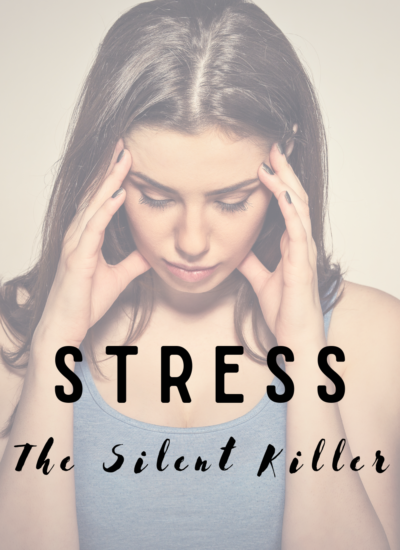This post may contain affiliate links. Please read the full disclosure here.
We all have experienced stress at some point in our lives. Stress can help you meet the challenges of life and thrive.
But what happens when you are constantly battling high stress levels?
Chronic stress can turn deadly. Regularly feeling stressed can increase your risk of developing mental illnesses, heart disease, diabetes, and obesity to name a few.
This post will discuss the stress response, the effects of stress, and ways you can start living a less stressful life.

What is Stress?
Stress is a normal part of life and can happen at any time. Joyous occasions, such as career promotions, getting married, moving, or becoming pregnant can bring stress into your life.
Stress is your body’s way of responding to change or threat. When feeling stressed, your body releases two stress hormones: adrenaline and cortisol.
When released, these two hormones activate the fight or flight response also known as the stress response.
Adrenaline and cortisol increase your blood pressure, heart rate, and blood sugar level while directing blood to major muscles to provide you with a boost of energy.
Have you ever been startled? Your heart starts pounds instantly and you may instinctively flail your arms in an attempt to fight back. After the threat is over, your heart rate returns to normal and your heightened senses lessen. This is the body’s stress response in action.
20 Warning Signs You are Stressed
Stress can manifest in various ways. It’s easy to overlook your physical response(s) to stress. Here are some common signs and symptoms of stress.
- Chest pain
- Rapid heartbeat
- Body aches and pains
- Low energy
- Nausea
- Change in appetite
- Change in sleeping habits
- Feeling nervous or jittery
- Feeling irritable, angry, overwhelmed
- Depression
- Anxiety
- Headaches
- Poor judgment
- Poor concentration
- Changes in memory
- Constantly worrying
- Frequently sick with cold, flu, or allergy symptoms
- Self-medicating with alcohol, cigarettes, or drugs
- Emotional eating
- Muscle tension
3 Types of Stress
Acute stress is occasional and lasts a couple of minutes to several hours. For instance, running late for work or having a simple misunderstanding with a loved one are examples of acute stress.
Episodic acute stress is when you experience acute stress frequently. Oftentimes, people in this category constantly feel overwhelmed.
Chronic stress lasts several hours per day for weeks or even months. For example, living in an emotionally toxic environment or not liking your job can lead to chronic stress. Also, experiencing acute stressors daily can turn into chronic stress.
Effects of Chronic Stress
The stress response helps you focus, increase awareness, and provides you with the energy to react and survive. Ideally, the body’s response to stress is meant to be short-term.
So when you are stressed continuously for long periods, your body is constantly releasing stress hormones, which has negative impacts.
The stress response increases your blood pressure, heart rate, breathing rate, and blood sugar levels. Sustaining elevated blood pressure and increased heart rate causes your heart to work harder and causes changes in your blood vessels. This eventually leads to heart disease, heart attack, or even stroke.
Elevated blood sugar levels will put you at a higher risk for developing diabetes and being obese.
The excess cortisol in your bloodstream suppresses the immune system, leading to frequent illnesses.
Over time, we can get used to feeling stressed, which can be dangerous. Normalizing your stress symptoms mean you are not consciously aware of your stress level.
As a result, your stress is probably going unchecked. As time goes by, stress can take a toll on your body and some effects are irreversible.
Neglecting your stress can silently ruin your health and lead to premature death.
Types of Chronic Stress
- Work-related stress is stress that arises from your place of employment.
Factors that lead to work-related stress are:
- Being unhappy with your job position
- Working long hours
- Having too many responsibilities
- Experiencing discrimination or harassment at work
- Having unclear work expectations
- Having an unsupportive supervisor and/or coworkers
2. Emotional stress results from life stressors that affect your mental wellbeing.
Below are some examples of emotional stressors:
- Divorce
- Death of a loved one
- Depression
- Anxiety
- Anger
- Grief
- Guilt
- Low self-esteem
3. Environment stress can arise due where you work and live.
Factors that cause environmental stress:
- Toxic living situation
- Unsafe living conditions
- Unsafe neighborhood
- Social and political climate
4. Relationship stress is caused by how well we get along with others.
Relationship stress can emerge due to:
- Arguing daily with your partner
- Having an unsupportive spouse or family
- Toxic relationship with your partner, family member, or friend
5. Financial stress is the worry and fear about having enough money.
Factors that contribute to financial stress are:
- Being in debt
- Job loss or low wages
- Not having an emergency fund
- Living above your means
- Living paycheck to paycheck
Effects of Chronic Stress
Chronic stress can take a physical and emotional toll on your body. Having stress hormones circulating in your bloodstream can lead to adverse health conditions. Here are some of the physical and emotional disturbances that can emerge.
- Mental illnesses- depression, anxiety, personality disorders
- Heart disease
- High blood pressure
- Heart attack
- Stroke
- Diabetes
- Acne
- Hair loss
- Digestive disorders- acid reflux, stomach ulcers
- Obesity
- Drug and alcohol abuse
- Cancer
- Eating disorders
30+ Ways to Ease Your Stress Level

Finding ways to cope with stress is a must. Here are some ways to reduce your stress level.
- Practice relaxation techniques- yoga, mediation, deep breathing, tai chi
- Exercise regularly
- Make time for fun activities
- Reduce stress triggers
- Talk to a friend or a professional
- Spend time in nature and get some sunshine
- Schedule time for yourself daily
- Practice mindfulness
- Improve organizational skills
- Practice positive self-talk
- Go with the flow
- Make a self-care routine
- Eat a healthy diet
- Take a day off and give yourself a mental break
- Get enough sleep
- Minimize alcohol, caffeine, and nicotine use
- Keep a stress diary
- Plan your day by using a planner or making a to-do list
- Learn to say no
- Watch a funny movie
- Drink plenty of water
- Drink stress relief herbal teas (my go-to is Yogi Stress Relief Teas)
- Use an oil diffuser and essential oils
- Avoid procrastination
- Listen to music
- Know when to take a time-out during the day
- Set realistic expectations for yourself
- Treat yourself to a spa day
- Take a hot bubble bath or shower
- Focus on what you can control
- Download stress-reducing apps- here’s a list of stress reduction apps
- Spend less time with negative people or people who drain your energy
- Ask for help whenever you feel overwhelmed
Stress-Reducing Self-Care Gift Ideas
Conclusion
Stress is a part of life. Stress can provide the needed boost to reach goals and deadlines. On the other hand, chronic stress can be debilitating and lead to distress and countless adverse health problems.
A research study concluded that stressful life events have a strong correlation to mental illness. The study went on to say that unchecked stress leads to overreacting, confusion, poor concentration, and sub-par performance. Check out the full research article here.
Practicing self-care is vital. We live in a fast-paced, stressful world. Do yourself a favor by being mindful of your stressors.
Essentially, your wellbeing depends on how well you cope with stress.
Developing a routine to better manage your stress in a healthy manner is vital.
Be aware of your stress level… your health and wellness depends on it!
How do you manage your stress level? Comment below!
References
Dhabhar, F. (2018, April). The short-term stress response – mother nature’s mechanism for enhancing protection and performance under conditions of threat, challenge, and opportunity. Retrieved February 07, 2021, from https://www.ncbi.nlm.nih.gov/pmc/articles/PMC5964013/
Salleh, M. (2008, October). Life event, stress and illness. Retrieved February 07, 2021, from https://www.ncbi.nlm.nih.gov/pmc/articles/PMC3341916/









Leave a Reply